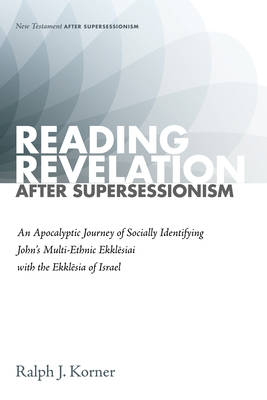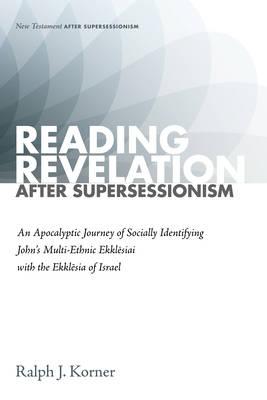
- Afhalen na 1 uur in een winkel met voorraad
- Gratis thuislevering in België vanaf € 30
- Ruim aanbod met 7 miljoen producten
- Afhalen na 1 uur in een winkel met voorraad
- Gratis thuislevering in België vanaf € 30
- Ruim aanbod met 7 miljoen producten
Zoeken
Reading Revelation After Supersessionism
An Apocalyptic Journey of Socially Identifying John's Multi-Ethnic Ekklēsiai with the Ekklēsia of Israel
Ralph J Korner
€ 68,45
+ 136 punten
Uitvoering
Omschrijving
In this volume, Ralph Korner argues that John's extensive social identification with Judaism(s), Jewishness, and Jewish institutions does not reflect a literary program of replacing Israel with the ekklēsiai ("churches"/"assemblies"), that is the Jewish and non-Jewish followers of Jesus as Israel's Messiah. Rather, John is emplacing his Christ-followers further within Israel, without thereby superseding Israel as a national identity for ethnic Jews who do not follow Jesus as the Christos. There are three primary roads travelled in this investigative journey. First, Korner explores ways in which a Jewish heritage is intrinsic to the literary structure, genre, eschatology, symbolism, and theological motifs of the Apocalypse. Second, he challenges the linear chronology of (generally) supersessionist dispensational readings of Revelation's visionary content by arguing for a reiterative/repetitive structure based on certain literary devices that also provide structure for visions within Jewish apocalypses and Hebrew prophecies. Third, he incorporates the most recent research on ekklēsia usage, especially in Asia Minor, to assess how John's ekklēsia associations might have been (non-supersessionally) perceived, especially by Jews in Roman Asia.
Specificaties
Betrokkenen
- Auteur(s):
- Uitgeverij:
Inhoud
- Aantal bladzijden:
- 332
- Taal:
- Engels
- Reeks:
Eigenschappen
- Productcode (EAN):
- 9781725274662
- Verschijningsdatum:
- 11/11/2020
- Uitvoering:
- Hardcover
- Formaat:
- Genaaid
- Afmetingen:
- 152 mm x 229 mm
- Gewicht:
- 657 g

Alleen bij Standaard Boekhandel
+ 136 punten op je klantenkaart van Standaard Boekhandel
Beoordelingen
We publiceren alleen reviews die voldoen aan de voorwaarden voor reviews. Bekijk onze voorwaarden voor reviews.











